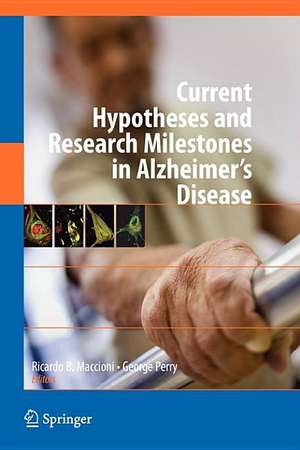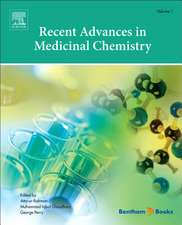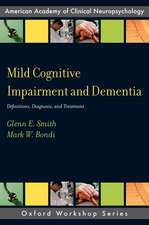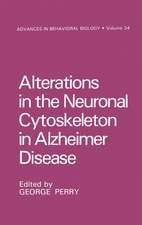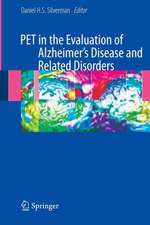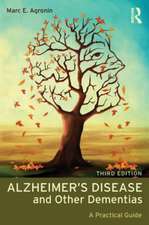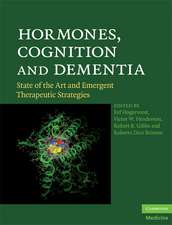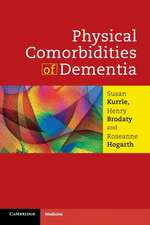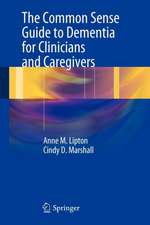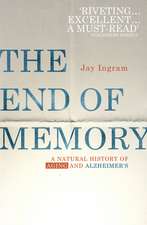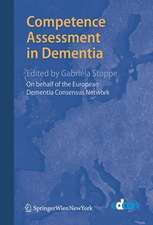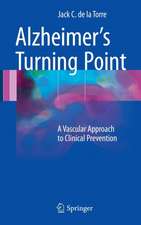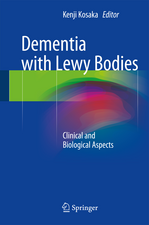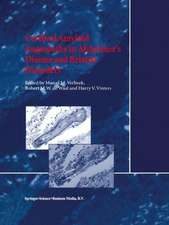Current Hypotheses and Research Milestones in Alzheimer's Disease
Editat de Ricardo B. Maccioni, George Perryen Limba Engleză Paperback – 7 dec 2010
Current Hypotheses and Research Milestones in Alzheimer's Disease contains 20 seminal chapters by authors with varying views on the neuroanatomical, neuropathological, neuropsychological, neurological, and molecular aspects of AD. These chapters grew out of “Current Hypothesis on Alzheimer’s Disease”, held in Viña del Mar, Chile, in November of 2007. Participants included the world’s leading Alzheimer’s researchers, whose work has illuminated AD investigations during the past few decades.
Students, academics and medical professionals will find this text an invaluable addition to the study of this important subject.
| Toate formatele și edițiile | Preț | Express |
|---|---|---|
| Paperback (1) | 783.99 lei 39-44 zile | |
| Springer Us – 7 dec 2010 | 783.99 lei 39-44 zile | |
| Hardback (1) | 949.73 lei 3-5 săpt. | |
| Springer Us – 24 mar 2009 | 949.73 lei 3-5 săpt. |
Preț: 783.99 lei
Preț vechi: 1031.57 lei
-24% Nou
Puncte Express: 1176
Preț estimativ în valută:
150.05€ • 156.06$ • 125.75£
150.05€ • 156.06$ • 125.75£
Carte tipărită la comandă
Livrare economică 10-15 martie
Preluare comenzi: 021 569.72.76
Specificații
ISBN-13: 9781441946904
ISBN-10: 144194690X
Pagini: 288
Ilustrații: X, 254 p. 135 illus., 35 illus. in color.
Dimensiuni: 155 x 235 x 15 mm
Greutate: 0.41 kg
Ediția:Softcover reprint of hardcover 1st ed. 2009
Editura: Springer Us
Colecția Springer
Locul publicării:New York, NY, United States
ISBN-10: 144194690X
Pagini: 288
Ilustrații: X, 254 p. 135 illus., 35 illus. in color.
Dimensiuni: 155 x 235 x 15 mm
Greutate: 0.41 kg
Ediția:Softcover reprint of hardcover 1st ed. 2009
Editura: Springer Us
Colecția Springer
Locul publicării:New York, NY, United States
Public țintă
ResearchDescriere
Almost four decades of innovative and intensive research on Alzheimer's disease (AD) have brought major advances in our understanding of its pathogenesis, improved tools for diagnosis, and strategies for its treatment. This research has helped build a solid foundation of knowledge in the neurosciences and biological basis of AD and AD-related neurological disorders. Scientific background and insightful hypotheses are of major relevance in order to approach to an effective therapy for this devastating disease.
Current Hypotheses and Research Milestones in Alzheimer's Disease contains 20 seminal chapters by authors with varying views on the neuroanatomical, neuropathological, neuropsychological, neurological, and molecular aspects of AD. These chapters grew out of "Current Hypothesis on Alzheimer’s Disease", held in Viña del Mar, Chile, in November of 2007. Participants included the world’s leading Alzheimer’s researchers, whose work has illuminated AD investigations during the past few decades.
Students, academics and medical professionals will find this text an invaluable addition to the study of this important subject.
About the Authors:
Ricardo B. Maccioni, Ph.D. is a Professor of Neurology at the Medical School and the Department of Molecular & Cellular Biology at the University of Chile. He also serves as the Director of the Laboratory of Molecular Neurosciences and Scientific Director of the International Center for Biomedicine (ICC). Dr. Maccioni received his doctoral degree in 1975 from the University of Chile, and served as a postdoctoral fellow at the University of Colorado Medical Center in Denver Colorado. He has made several major contributions to the the study of Alzheimer’s disease, including his discoveries on the role of tau protein and neuroimmunomodulation in the pathogenesis of this disease, and the design of new in vivo imaging technology and the novel biomarkers for its early diagnosis. He has received more than 60 research grants and several international and national prizes, including the Presidential Chair in Science, the Chancellor´s medal of the University of Chile, and Doctor Honris causa at several universities. Dr. Macconi has organized over forty international conferences with experts in the neurosciences from around the world.
George Perry, Ph.D. is the Dean of the College of Sciences at The University of Texas at San Antonio. Dr. Perry received his doctoral degree in marine biology from the Scripps Institution of Oceanography at the University of California at San Diego, served as a postdoctoral fellow in cell biology at Baylor College of Medicine, and earned a bachelor's degree in zoology from the University of California at Santa Barbara. He is an authority on Alzheimer’s research; his groundbreaking work brought oxidative stress to the study of AD. This discovery, far in advance of others, has put him among the top dozen most cited investigators studying AD/oxidative stress and among the top 25 neuroscientists in the world. Dr. Perry serves on the editorial board of more than 60 publications and is founding Editor-in-Chief of the highest impact journal in AD, The Journal of Alzheimer’s Disease. He recently won the Denham Harmon Lifetime Achievement Award (discoverer of the Free Radical Theory of Aging) from the American Association for Aging, and currently holds the Zenith Award from the Alzheimer Association.
Current Hypotheses and Research Milestones in Alzheimer's Disease contains 20 seminal chapters by authors with varying views on the neuroanatomical, neuropathological, neuropsychological, neurological, and molecular aspects of AD. These chapters grew out of "Current Hypothesis on Alzheimer’s Disease", held in Viña del Mar, Chile, in November of 2007. Participants included the world’s leading Alzheimer’s researchers, whose work has illuminated AD investigations during the past few decades.
Students, academics and medical professionals will find this text an invaluable addition to the study of this important subject.
About the Authors:
Ricardo B. Maccioni, Ph.D. is a Professor of Neurology at the Medical School and the Department of Molecular & Cellular Biology at the University of Chile. He also serves as the Director of the Laboratory of Molecular Neurosciences and Scientific Director of the International Center for Biomedicine (ICC). Dr. Maccioni received his doctoral degree in 1975 from the University of Chile, and served as a postdoctoral fellow at the University of Colorado Medical Center in Denver Colorado. He has made several major contributions to the the study of Alzheimer’s disease, including his discoveries on the role of tau protein and neuroimmunomodulation in the pathogenesis of this disease, and the design of new in vivo imaging technology and the novel biomarkers for its early diagnosis. He has received more than 60 research grants and several international and national prizes, including the Presidential Chair in Science, the Chancellor´s medal of the University of Chile, and Doctor Honris causa at several universities. Dr. Macconi has organized over forty international conferences with experts in the neurosciences from around the world.
George Perry, Ph.D. is the Dean of the College of Sciences at The University of Texas at San Antonio. Dr. Perry received his doctoral degree in marine biology from the Scripps Institution of Oceanography at the University of California at San Diego, served as a postdoctoral fellow in cell biology at Baylor College of Medicine, and earned a bachelor's degree in zoology from the University of California at Santa Barbara. He is an authority on Alzheimer’s research; his groundbreaking work brought oxidative stress to the study of AD. This discovery, far in advance of others, has put him among the top dozen most cited investigators studying AD/oxidative stress and among the top 25 neuroscientists in the world. Dr. Perry serves on the editorial board of more than 60 publications and is founding Editor-in-Chief of the highest impact journal in AD, The Journal of Alzheimer’s Disease. He recently won the Denham Harmon Lifetime Achievement Award (discoverer of the Free Radical Theory of Aging) from the American Association for Aging, and currently holds the Zenith Award from the Alzheimer Association.
Cuprins
Amyloid-ß: General Aspects.- Role of A? Degrading Enzymes in Synaptic Plasticity and Neurogenesis in Alzheimer’s Disease.- Pore-Forming Neurotoxin-Like Mechanism for A? Oligomer-Induced Synaptic Failure.- Interventions in Aging and Neurodegenerative Disease: Effects on Adult StemCells.- Neuronal Cytoskeleton and the Tau Hypothesis.- Tau Transgenic Mouse Models in Therapeutic Development.- What Have We Learned from the Tau Hypothesis?.- Neuronal Cytoskeleton Regulation and Neurodegeneration.- Stages of Pathological Tau-Protein Processing in Alzheimer’s Disease: From Soluble Aggregations to Polymerization into Insoluble Tau-PHFs.- Plasma Membrane-Associated PHF-Core Could be the Trigger for Tau Aggregation in Alzheimer’s Disease.- Oxidative Stress Hypothesis.- Neurofibrillary Tangle Formation as a Protective Response to Oxidative Stress in Alzheimer’s Disease.- Neuroimmunological Hypothesis.- Inflammatory Processes Exacerbate Degenerative Neurological Disorders.- Central Nervous System Inflammation and Cholesterol Metabolism Alterations in the Pathogenesis of Alzheimer’s Disease and Their Diagnostic and Therapeutic Implications.- Participation of Glial Cells in the Pathogenesis of AD: A Different View on Neuroinflammation.- Cerebrovascular Pathology and AD.- Cerebral and Cardiac Vascular Pathology in Alzheimer’s Disease.- Are Amyloids Infectious?.- The Possible Link Between Herpes Simplex Virus Type 1 Infection and Neurodegeneration.- General Aspects of AD Pathogenesis.- Selective Cerebrocortical Regional, Laminar, Modular and Cellular Vulnerability and Sparing in Alzheimer’s Disease: Unexploited Clues to Pathogenesis, Pathophysiology, Molecular- and Systems-Level Hypothesis Generation and Experimental Testing.- How Biochemical Pathways for Disease May be Triggered by Early-Life Events.- Biomarkers and AD.- Strategies for Alzheimer's Disease Diagnosis.- Cognitive Neurology in AD.- The Diagnosis of Dementia in Subjects with Heterogeneous Educational Levels.- Current Anti-Dementia Drugs: Hypothesis and Clinical Benefits.
Notă biografică
About the authors:
Ricardo B. Maccioni, Ph.D. is a Professor of Neurology at the Medical School and the Department of Biology, Faculty of Sciences, at the University of Chile. George Perry, Ph.D. is the Dean of the College of Sciences at The University of Texas at San Antonio. Dr. Perry received his doctoral degree in marine biology from the Scripps Institution of Oceanography at the University of California at San Diego, served as a postdoctoral fellow in cell biology at Baylor College of Medicine, and earned a bachelor's degree in zoology from the University of California at Santa Barbara. He is an authority on Alzheimer’s research; his groundbreaking work brought oxidative stress to the study of AD. This discovery, far in advance of others, has put him among the top dozen most cited investigators studying AD/oxidative stress and among the top 25 neuroscientists in the world. Dr. Perry serves on the editorial board of more than 60 publications and is founding Editor-in-Chief of the highest impact journal in AD research, the Journal of Alzheimer’s Disease. He recently won the Denham Harmon Lifetime Achievement Award (discoverer of the Free Radical Theory of Aging) from the American Association for Aging, and currently holds the Zenith Award from the Alzheimer Association.
Ricardo B. Maccioni, Ph.D. is a Professor of Neurology at the Medical School and the Department of Biology, Faculty of Sciences, at the University of Chile. George Perry, Ph.D. is the Dean of the College of Sciences at The University of Texas at San Antonio. Dr. Perry received his doctoral degree in marine biology from the Scripps Institution of Oceanography at the University of California at San Diego, served as a postdoctoral fellow in cell biology at Baylor College of Medicine, and earned a bachelor's degree in zoology from the University of California at Santa Barbara. He is an authority on Alzheimer’s research; his groundbreaking work brought oxidative stress to the study of AD. This discovery, far in advance of others, has put him among the top dozen most cited investigators studying AD/oxidative stress and among the top 25 neuroscientists in the world. Dr. Perry serves on the editorial board of more than 60 publications and is founding Editor-in-Chief of the highest impact journal in AD research, the Journal of Alzheimer’s Disease. He recently won the Denham Harmon Lifetime Achievement Award (discoverer of the Free Radical Theory of Aging) from the American Association for Aging, and currently holds the Zenith Award from the Alzheimer Association.
Textul de pe ultima copertă
Almost four decades of innovative and intensive research on Alzheimer's disease (AD) have brought major advances in our understanding of its pathogenesis, while improving tools for diagnosis and developing strategies for its treatment. This research has helped build a solid foundation of knowledge in the neurosciences and biological basis of AD and AD-related neurological disorders. Current Hypotheses and Research Milestones in Alzheimer's Disease contains 20 seminal chapters by authors with varying views on the neuroanatomical, neuropathological, neuropsychological, neurological, and molecular aspects of AD, and offers the scientific background and insightful hypotheses needed to create an effective therapy for this devastating disease. These chapters grew out of "Current Hypothesis on Alzheimer’s Disease," held in Viña del Mar, Chile, in November of 2007. Participants included the world’s leading Alzheimer’s researchers, whose work have illuminated AD investigations during the past few decades.
Students, academics and medical professionals will find this text an invaluable addition to the study of this important subject.
About the Authors:
Ricardo B. Maccioni, Ph.D. is a Professor of Neurology at the Medical School and the Department of Biology, Faculty of Sciences, at the University of Chile. He also serves as the Director of the Laboratory of Molecular Neurosciences and Scientific Director of the International Center for Biomedicine (ICC). Dr. Maccioni received his doctoral degree in 1975 from the University of Chile, and served as a postdoctoral fellow at the University of Colorado Medical Center in Denver Colorado. He has made several major contributions to the the study of Alzheimer’s disease, including his discoveries on the role of tau protein and neuroimmunomodulation in the pathogenesis of this disease, and the design of new in vivo imaging technology and the novel biomarkers for its early diagnosis. He has received more than 60 research grants and several international and national prizes, including the Presidential Chair in Science, the Chancellor´s medal of the University of Chile, and Doctor Honris causa at several universities. Dr. Macconi has organized over forty international conferences with experts in the neurosciences from around the world.
George Perry, Ph.D. is the Dean of the College of Sciences at The University of Texas at San Antonio. Dr. Perry received his doctoral degree in marine biology from the Scripps Institution of Oceanography at the University of California at San Diego, served as a postdoctoral fellow in cell biology at Baylor College of Medicine, and earned a bachelor's degree in zoology from the University of California at Santa Barbara. He is an authority on Alzheimer’s research, and his groundbreaking work brought oxidative stress to the study of AD. This discovery, far in advance of others, has put him among the top dozen most cited investigators studying AD/oxidative stress and among the top 25 neuroscientists in the world. Dr. Perry serves on the editorial board of more than 60 publications and is founding Editor-in-Chief of the Journal of Alzheimer’s Disease, the highest impact journal in AD studies. He recently won the Denham Harmon Lifetime Achievement Award (discoverer of the Free Radical Theory of Aging) from the American Association for Aging, and currently holds the Zenith Award from the Alzheimer Association.
Students, academics and medical professionals will find this text an invaluable addition to the study of this important subject.
About the Authors:
Ricardo B. Maccioni, Ph.D. is a Professor of Neurology at the Medical School and the Department of Biology, Faculty of Sciences, at the University of Chile. He also serves as the Director of the Laboratory of Molecular Neurosciences and Scientific Director of the International Center for Biomedicine (ICC). Dr. Maccioni received his doctoral degree in 1975 from the University of Chile, and served as a postdoctoral fellow at the University of Colorado Medical Center in Denver Colorado. He has made several major contributions to the the study of Alzheimer’s disease, including his discoveries on the role of tau protein and neuroimmunomodulation in the pathogenesis of this disease, and the design of new in vivo imaging technology and the novel biomarkers for its early diagnosis. He has received more than 60 research grants and several international and national prizes, including the Presidential Chair in Science, the Chancellor´s medal of the University of Chile, and Doctor Honris causa at several universities. Dr. Macconi has organized over forty international conferences with experts in the neurosciences from around the world.
George Perry, Ph.D. is the Dean of the College of Sciences at The University of Texas at San Antonio. Dr. Perry received his doctoral degree in marine biology from the Scripps Institution of Oceanography at the University of California at San Diego, served as a postdoctoral fellow in cell biology at Baylor College of Medicine, and earned a bachelor's degree in zoology from the University of California at Santa Barbara. He is an authority on Alzheimer’s research, and his groundbreaking work brought oxidative stress to the study of AD. This discovery, far in advance of others, has put him among the top dozen most cited investigators studying AD/oxidative stress and among the top 25 neuroscientists in the world. Dr. Perry serves on the editorial board of more than 60 publications and is founding Editor-in-Chief of the Journal of Alzheimer’s Disease, the highest impact journal in AD studies. He recently won the Denham Harmon Lifetime Achievement Award (discoverer of the Free Radical Theory of Aging) from the American Association for Aging, and currently holds the Zenith Award from the Alzheimer Association.
Caracteristici
Focuses on the latest research in Alzheimer’s disease presented at the International Conference on Current Hypotheses on Alzheimer’s Disease, November 22-25, 2007, in Viña del Mar, Chile
Includes supplementary material: sn.pub/extras
Includes supplementary material: sn.pub/extras
